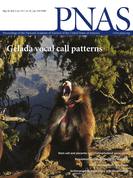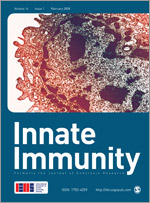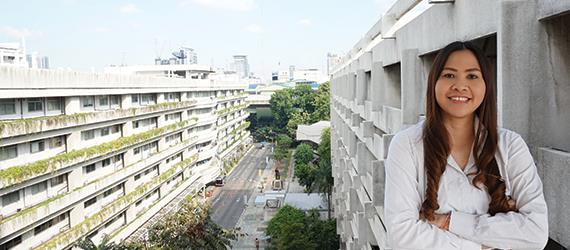
Dr. Ponpuak received a National Scholarship for studying abroad from The Development and Promotion of Science and Technology Talent Project (DPST) of Thailand to pursue her study in the U.S.A. She attended University of Wisconsin-Madison and obtained her Bachelor’s degree in Molecular Biology with honors in 2001. She then went on to study her Ph.D. at Washington University, School of Medicine and joined the lab of Prof. Daniel E. Goldberg, Howard Huges Medical Institute and the Department of Molecular Microbiology, Washington University. Her Ph.D. work was focused on the biology of the human malarial parasite Plasmodium falciparum, the causative agent of Malaria. This work was published in Molecular Microbiology journal in which a new function/location of a food vacuole enzyme named falcilysin was discovered and characterized. A commentary on this article was published in the same issue.
After completion of her Ph.D. in 2007, she joined the laboratory of Prof. Vojo Deretic, Department of Molecular Genetics and Microbiology, University of New Mexico, U.S.A. for her postdoctoral training. There she has acquired significant knowledge and skills in autophagy and innate immunity of the host against intracellular pathogens. Her work uncovered a novel way host cells utilize autophagy to kill intracellular Mycobacterium tuberculosis, the causative agent of Tuberculosis. In this mechanism, autophagosomes engulf cytosolic substrates and convert them into neo-antimicrobial peptides, which upon fusion with pathogen-containing compartments, result in the elimination of the pathogen. This work was published in Immunity journal and a commentary on this article was published in the same issue.
In 2010, Dr. Ponpuak joined the Department of Microbiology, Faculty of Science, Mahidol University. Here, she focuses her studies on autophagy and its role in infectious diseases of global importance. Through collaborations with various groups of researchers both local and abroad, she has expanded the knowledge on autophagy pathway and its regulation during infections. Her latest work was published in PNAS journal (through collaboration with Dr. Jetsumon Prachumsri, the director of the Mahidol Vivax Research Unit) in which a non-canonical autophagy process termed LAP-like was discovered as a novel IFN-γ downstream effector in the elimination of the human malarial parasite Plasmodium vivax. A commentary on this article was published in the same journal. Dr. Ponpuak has now extended her work to study not only the host cell autonomous immunity against the bacterium M. tuberculosis and the human malarial parasite Plasmodium vivax, but also the Dengue Virus, the causative agent of Dengue hemorrhagic fever and shock syndrome. It is hoped that the knowledge obtained from these studies will further our understanding of host-pathogen interactions and help aid in the better control of these diseases.
Selected Publications

LAP-like process as an immune mechanism downstream of IFN-γ in control of the human malaria Plasmodium vivax liver stage. (Boonhok et al., PNAS, 2016).

Resistance to cellular autophagy by Mycobacterium tuberculosis Beijing strains. (Haque et al., Innate Immun, 2015).

